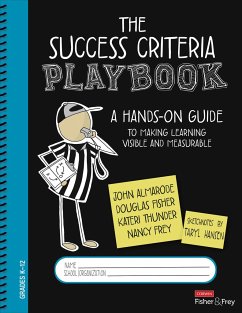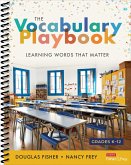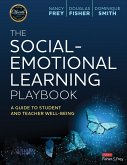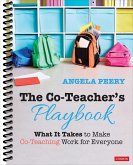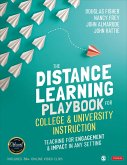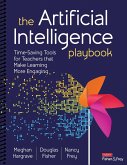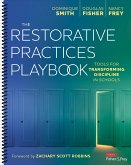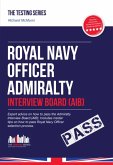John T. Almarode, Douglas Fisher, Kateri Thunder
The Success Criteria Playbook
A Hands-On Guide to Making Learning Visible and Measurable
John T. Almarode, Douglas Fisher, Kateri Thunder
The Success Criteria Playbook
A Hands-On Guide to Making Learning Visible and Measurable
- Broschiertes Buch
- Merkliste
- Auf die Merkliste
- Bewerten Bewerten
- Teilen
- Produkt teilen
- Produkterinnerung
- Produkterinnerung
Ensure equity of access to learning and opportunity for all students by designing and employing high-quality, high-impact success criteria that connect learners to a shared understanding of what success looks like for any given learning intention.
Andere Kunden interessierten sich auch für
![The Vocabulary Playbook The Vocabulary Playbook]() Douglas FisherThe Vocabulary Playbook46,99 €
Douglas FisherThe Vocabulary Playbook46,99 €![The Social-Emotional Learning Playbook The Social-Emotional Learning Playbook]() Nancy Frey (USA San Diego State University)The Social-Emotional Learning Playbook46,99 €
Nancy Frey (USA San Diego State University)The Social-Emotional Learning Playbook46,99 €![The Co-Teacher′s Playbook The Co-Teacher′s Playbook]() Angela PeeryThe Co-Teacher′s Playbook46,99 €
Angela PeeryThe Co-Teacher′s Playbook46,99 €![The Distance Learning Playbook for College and University Instruction The Distance Learning Playbook for College and University Instruction]() Douglas FisherThe Distance Learning Playbook for College and University Instruction39,99 €
Douglas FisherThe Distance Learning Playbook for College and University Instruction39,99 €![The Artificial Intelligence Playbook The Artificial Intelligence Playbook]() Meghan HargraveThe Artificial Intelligence Playbook43,99 €
Meghan HargraveThe Artificial Intelligence Playbook43,99 €![The Restorative Practices Playbook The Restorative Practices Playbook]() Dominique SmithThe Restorative Practices Playbook43,99 €
Dominique SmithThe Restorative Practices Playbook43,99 €![Royal Navy Officer Admiralty Interview Board Workbook: How to Pass the AIB Including Interview Questions, Planning Exercises and Scoring Criteria Royal Navy Officer Admiralty Interview Board Workbook: How to Pass the AIB Including Interview Questions, Planning Exercises and Scoring Criteria]() Richard McMunnRoyal Navy Officer Admiralty Interview Board Workbook: How to Pass the AIB Including Interview Questions, Planning Exercises and Scoring Criteria16,99 €
Richard McMunnRoyal Navy Officer Admiralty Interview Board Workbook: How to Pass the AIB Including Interview Questions, Planning Exercises and Scoring Criteria16,99 €-
-
-
Ensure equity of access to learning and opportunity for all students by designing and employing high-quality, high-impact success criteria that connect learners to a shared understanding of what success looks like for any given learning intention.
Hinweis: Dieser Artikel kann nur an eine deutsche Lieferadresse ausgeliefert werden.
Hinweis: Dieser Artikel kann nur an eine deutsche Lieferadresse ausgeliefert werden.
Produktdetails
- Produktdetails
- Verlag: SAGE Publications Inc
- Seitenzahl: 224
- Erscheinungstermin: 26. Mai 2021
- Englisch
- Abmessung: 272mm x 227mm x 16mm
- Gewicht: 570g
- ISBN-13: 9781071831540
- ISBN-10: 1071831542
- Artikelnr.: 60181660
- Herstellerkennzeichnung
- Libri GmbH
- Europaallee 1
- 36244 Bad Hersfeld
- gpsr@libri.de
- Verlag: SAGE Publications Inc
- Seitenzahl: 224
- Erscheinungstermin: 26. Mai 2021
- Englisch
- Abmessung: 272mm x 227mm x 16mm
- Gewicht: 570g
- ISBN-13: 9781071831540
- ISBN-10: 1071831542
- Artikelnr.: 60181660
- Herstellerkennzeichnung
- Libri GmbH
- Europaallee 1
- 36244 Bad Hersfeld
- gpsr@libri.de
Dr. John Almarode is a bestselling author and an Associate Professor of Education at James Madison University. He was awarded the inaugural Sarah Miller Luck Endowed Professorship in 2015 and received an Outstanding Faculty Award from the State Council for Higher Education in Virginia in 2021. Before his academic career, John started as a mathematics and science teacher in Augusta County, Virginia. As an author, John has written multiple educational books focusing on science and mathematics, and he has co-created a new framework for developing, implementing, and sustaining professional learning communities called PLC+. Dr. Almarode¿s work has been presented to the US Congress, the Virginia Senate, and the US Department of Education. John and his colleagues have also focused a lot of attention on the process of implementation - taking evidence-based practices and moving them from intention to implementation, potential to impact through a series of on-your-feet-guides around PLCs, Visible Learning, Visible Teaching, and the SOLO Taxonomy.
Introduction
Module 1: What are success criteria?
Module 2: What are the challenges to creating and implementing success
criteria? How do we overcome those challenges?
Module 3: How do success criteria pave the way for equity?
Module 4: Creating and implementing effective "I Can"/"We Can" statements
Module 5: Creating and implementing single-point rubrics
Module 6: Creating and implementing rubrics
Module 7: Creating and implementing success criteria through teacher
modeling
Module 8: Creating and implementing success criteria through exemplars
Module 9: Co-constructing criteria for success
Module 10: Different types of success criteria for different aspects of
learning
Module 11: How do we use success criteria to foster meta-cognition
Module 12: How do success criteria support deliberate practice and transfer
of learning?
Module 13: What is the relationship between success criteria and feedback?
Module 14: How do we use success criteria to fulfill the promise of equity?
References
Module 1: What are success criteria?
Module 2: What are the challenges to creating and implementing success
criteria? How do we overcome those challenges?
Module 3: How do success criteria pave the way for equity?
Module 4: Creating and implementing effective "I Can"/"We Can" statements
Module 5: Creating and implementing single-point rubrics
Module 6: Creating and implementing rubrics
Module 7: Creating and implementing success criteria through teacher
modeling
Module 8: Creating and implementing success criteria through exemplars
Module 9: Co-constructing criteria for success
Module 10: Different types of success criteria for different aspects of
learning
Module 11: How do we use success criteria to foster meta-cognition
Module 12: How do success criteria support deliberate practice and transfer
of learning?
Module 13: What is the relationship between success criteria and feedback?
Module 14: How do we use success criteria to fulfill the promise of equity?
References
Introduction
Module 1: What are success criteria?
Module 2: What are the challenges to creating and implementing success
criteria? How do we overcome those challenges?
Module 3: How do success criteria pave the way for equity?
Module 4: Creating and implementing effective "I Can"/"We Can" statements
Module 5: Creating and implementing single-point rubrics
Module 6: Creating and implementing rubrics
Module 7: Creating and implementing success criteria through teacher
modeling
Module 8: Creating and implementing success criteria through exemplars
Module 9: Co-constructing criteria for success
Module 10: Different types of success criteria for different aspects of
learning
Module 11: How do we use success criteria to foster meta-cognition
Module 12: How do success criteria support deliberate practice and transfer
of learning?
Module 13: What is the relationship between success criteria and feedback?
Module 14: How do we use success criteria to fulfill the promise of equity?
References
Module 1: What are success criteria?
Module 2: What are the challenges to creating and implementing success
criteria? How do we overcome those challenges?
Module 3: How do success criteria pave the way for equity?
Module 4: Creating and implementing effective "I Can"/"We Can" statements
Module 5: Creating and implementing single-point rubrics
Module 6: Creating and implementing rubrics
Module 7: Creating and implementing success criteria through teacher
modeling
Module 8: Creating and implementing success criteria through exemplars
Module 9: Co-constructing criteria for success
Module 10: Different types of success criteria for different aspects of
learning
Module 11: How do we use success criteria to foster meta-cognition
Module 12: How do success criteria support deliberate practice and transfer
of learning?
Module 13: What is the relationship between success criteria and feedback?
Module 14: How do we use success criteria to fulfill the promise of equity?
References

